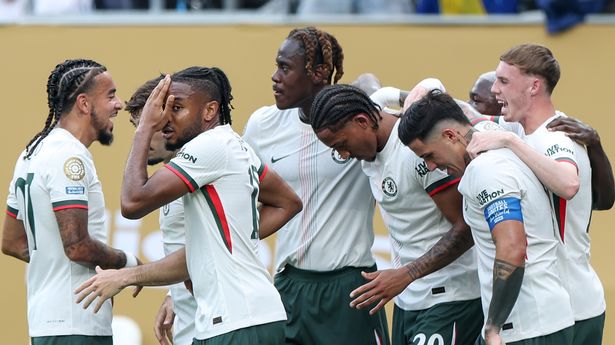Bring on Real Madrid or PSG? Chelsea’s stunning journey from underdogs to FIFA Club World Cup finalists

Chelsea reach FIFA Club World Cup final after stunning run—Pedro strikes twice in semifinal win
When Chelsea entered the 2025 FIFA Club World Cup, few saw them as serious contenders. The London side had just undergone another managerial transition, with Enzo Maresca taking the reins. Their 2024/25 Premier League season was underwhelming, and expectations for the Club World Cup were modest at best. Yet, what followed has become one of the most talked-about campaigns of the tournament—a mix of tactical brilliance, breakout performances, and a growing sense of belief within the squad. Chelsea’s journey from underdogs to finalists is not only remarkable but also proof of how quickly fortunes can change in football.
Group Stage: Confidence Gained Early
Chelsea was drawn into a competitive Group D that featured Flamengo, Esperance de Tunis, and LAFC. Despite the unfamiliar terrain and climate in the United States, the Blues quickly set the tone. In their opening game, they dispatched LAFC 2–0, showing discipline and structure. The goals came from Pedro Neto and Enzo Fernández, two players central to their campaign. They followed that up with an emphatic 3–0 win against Esperance, with young talents like Liam Delap and Tyrique George stepping up to the occasion.
Even their narrow loss to Flamengo in the group finale didn’t dampen the momentum. Chelsea had already secured enough points to qualify for the Round of 16. That early momentum, built on solid defending and clinical finishing, would become a blueprint for their knockout stage success.
Knockout Rounds: Tactical Maturity and Big Performances
In the Round of 16, Chelsea faced Benfica—another side underestimated during this tournament. The Blues, however, made light work of the Portuguese club, securing a 4–1 victory that surprised many pundits. João Pedro, their £60 million summer signing from Brighton, began to show signs of his breakout form, while Maresca’s rotational strategy paid off. The midfield pairing of Palmer and Fernández dictated play, while the backline—anchored by Cucurella and Adarabioyo—looked composed.
Their quarter-final clash against Palmeiras was a step up in challenge. The Brazilian giants, having knocked out Manchester City in the previous round, posed a serious threat. But Chelsea held firm, snatching a 2–1 victory in a tense affair that required both defensive discipline and moments of attacking class. It was at this point that critics began to reframe Chelsea—from tournament survivors to potential winners.
Semi-Final vs Fluminense: João Pedro Steals the Show
In the semi-final, Chelsea came up against Fluminense, a Brazilian side known for their fluid, attacking football. Played under intense summer heat in New Jersey, the match demanded both fitness and focus. João Pedro rose to the occasion, scoring both goals in a 2–0 win that sent Chelsea into the final. His first was a curling finish from outside the box in the 18th minute, and he sealed the game with a composed second-half strike.
While Pedro earned the spotlight, Chelsea’s performance was built on collective strength. VAR denied Fluminense a penalty midway through the match, and a goal-line clearance from Cucurella kept the clean sheet intact. Maresca praised his team for their concentration and tactical awareness, especially in a high-pressure fixture. The semi-final marked Chelsea’s most complete performance of the tournament, sending a clear message: they belong in the final.
What’s Behind Chelsea’s Success?
Several key factors explain Chelsea’s unexpected rise. First, Enzo Maresca’s tactical system—rooted in possession-based football with quick transitional play—has given structure to a previously inconsistent side. His intelligent rotation of players has kept the squad fresh, with young stars like Tyrique George, Liam Delap, and Alfie Gilchrist stepping up when called upon.
Second, Chelsea’s summer transfers are beginning to click. João Pedro has not only justified his hefty price tag but become the tournament’s breakout star. Players like Neto and Fernández have also grown into leadership roles. The Blues have also benefited from a favourable tournament draw—after early exits by Inter Milan and Manchester City, their pathway to the final became significantly more manageable.
Finally, the hunger within the squad cannot be overlooked. For many players, this tournament represents a shot at global recognition and silverware in a season that had started with uncertainty. The synergy between youth and experience is now producing results on the pitch.
The Road to Glory: Who Awaits in the Final?
Chelsea will now face either Real Madrid or Paris Saint-Germain in the final, set to be played on Saturday, July 13, at MetLife Stadium in New Jersey. Either opponent presents a formidable challenge. Real Madrid brings pedigree, experience, and individual brilliance, while PSG—led by a post-Mbappé rebuild—has a hungry, high-energy team eager for continental validation.
Whichever team they face, Chelsea will need another high-level performance. João Pedro must maintain his scoring form, and the midfield must neutralize their opponent’s creative threats. Their defensive line, though solid so far, will need to handle the pressure of world-class attacks. If they can maintain their current rhythm and belief, Chelsea has a real shot at lifting the Club World Cup for the second time in four years.
Can Chelsea Clinch the Trophy?
Chelsea’s rise in this tournament is more than just a feel-good story—it’s a statement of intent. A win in the final would mean more than just a trophy. It would symbolize a turning point under Enzo Maresca and offer a massive confidence boost ahead of the next Premier League season. It could also bring in over £100 million in prize money, adding financial momentum to a club still recovering from ownership and squad transitions.
For fans who doubted the team’s direction just months ago, this campaign has reignited belief. From underestimated entrants to legitimate contenders, Chelsea’s 2025 Club World Cup journey is one for the history books. All eyes now turn to July 13, where their biggest test awaits—and with it, a chance to finish a remarkable run with global glory.

